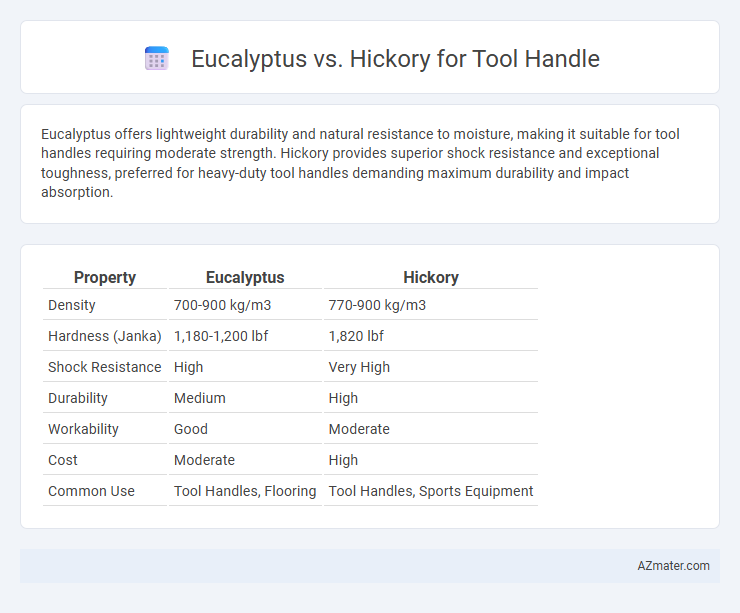Eucalyptus offers lightweight durability and natural resistance to moisture, making it suitable for tool handles requiring moderate strength. Hickory provides superior shock resistance and exceptional toughness, preferred for heavy-duty tool handles demanding maximum durability and impact absorption.
Table of Comparison
| Property | Eucalyptus | Hickory |
|---|---|---|
| Density | 700-900 kg/m3 | 770-900 kg/m3 |
| Hardness (Janka) | 1,180-1,200 lbf | 1,820 lbf |
| Shock Resistance | High | Very High |
| Durability | Medium | High |
| Workability | Good | Moderate |
| Cost | Moderate | High |
| Common Use | Tool Handles, Flooring | Tool Handles, Sports Equipment |
Introduction: Choosing the Right Wood for Tool Handles
Eucalyptus and hickory are popular choices for tool handles due to their durability and strength. Eucalyptus offers a dense, shock-resistant grain that enhances tool longevity, while hickory is renowned for its exceptional toughness and impact absorption, making it ideal for heavy-duty tools. Selecting between eucalyptus and hickory depends on the specific tool application and the required balance of weight, hardness, and vibration resistance.
Eucalyptus vs Hickory: Overview and Origins
Eucalyptus and Hickory differ significantly in tool handle applications due to their distinct densities and origins; Hickory, native to North America, is renowned for its exceptional shock resistance and toughness, making it a traditional choice for tool handles. Eucalyptus, primarily from Australia, offers a dense, durable hardwood but tends to be less flexible and heavier than Hickory, affecting grip comfort and tool balance. The historical use of Hickory in tool handles stems from its superior ability to absorb impact, whereas Eucalyptus is often selected for its availability and cost-effectiveness in certain regions.
Strength and Durability Comparison
Eucalyptus wood offers moderate strength and good shock resistance, making it suitable for tool handles that require flexibility and wear resistance. Hickory is known for its superior strength, hardness, and exceptional durability, often preferred for heavy-duty tool handles due to its excellent impact absorption and resistance to splitting. When comparing eucalyptus vs hickory for tool handles, hickory typically outperforms eucalyptus in terms of strength and long-term durability under rigorous use.
Shock Absorption and Comfort in Use
Eucalyptus offers moderate shock absorption with a dense grain that provides decent durability but may transfer more vibration to the hand during prolonged use. Hickory excels in shock absorption due to its natural elasticity and toughness, reducing hand fatigue and increasing comfort for extended tool work. Comfort in use favors hickory handles as their superior impact resistance and slight flexibility minimize vibrations and enhance grip stability.
Weight and Workability Differences
Eucalyptus tool handles are generally lighter than hickory, offering reduced fatigue during extended use while maintaining sufficient strength and durability. Hickory's dense, fibrous grain provides superior shock absorption and resilience, making it the preferred choice for heavy-duty applications where impact resistance is crucial. The workability of eucalyptus is smoother due to its finer grain, whereas hickory requires more effort to shape but excels in long-term performance under stress.
Resistance to Weather and Decay
Eucalyptus wood offers superior resistance to weather and decay due to its natural oils and dense grain structure, making it a durable choice for tool handles exposed to outdoor conditions. Hickory, while extremely tough and shock-resistant, is more susceptible to moisture absorption and requires regular maintenance to prevent decay. For long-lasting weather resistance, eucalyptus handles are preferred, though hickory remains favored for its strength and impact absorption in dry environments.
Cost and Availability of Eucalyptus and Hickory
Hickory tool handles generally command a higher price due to their superior shock resistance and established market demand, while eucalyptus offers a more cost-effective alternative with reasonable durability. Hickory is widely available in North America, making it the preferred choice for professional-grade handles, whereas eucalyptus is more abundant and affordable in regions like Australia and parts of Asia. Cost and availability differences largely depend on geographic location, with eucalyptus serving as a budget-friendly option where hickory is scarce or expensive to import.
Suitability for Different Types of Tools
Eucalyptus offers moderate hardness and shock resistance, making it suitable for lightweight tools such as garden rakes and hoes. Hickory provides exceptional strength, flexibility, and durability, ideal for heavy-impact tools like hammers, axes, and sledgehammers. The superior resilience of hickory handles enhances user control and reduces fatigue during prolonged use of striking tools.
User Preferences and Professional Recommendations
Eucalyptus offers a lightweight and cost-effective option for tool handles, favored by users who prioritize ease of use and budget. Hickory is preferred by professionals for its superior shock absorption, durability, and strength, making it ideal for heavy-duty and long-term applications. Experts recommend hickory handles for demanding tasks while suggesting eucalyptus handles for lighter, occasional use.
Conclusion: Which Wood is Best for Tool Handles?
Eucalyptus combines high density and shock resistance, making it suitable for durable, heavy-duty tool handles, while Hickory offers exceptional toughness and excellent elasticity, preferred for impact absorption and comfort during prolonged use. Choosing between Eucalyptus and Hickory depends on the specific tool application, with Hickory favored for tools requiring resilience and flexibility, and Eucalyptus for those demanding stiffness and hardness. Overall, Hickory is often regarded as the best wood for tool handles due to its proven balance of strength, shock absorption, and durability in various working conditions.

Infographic: Eucalyptus vs Hickory for Tool Handle
 azmater.com
azmater.com